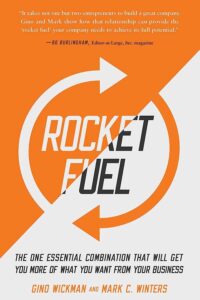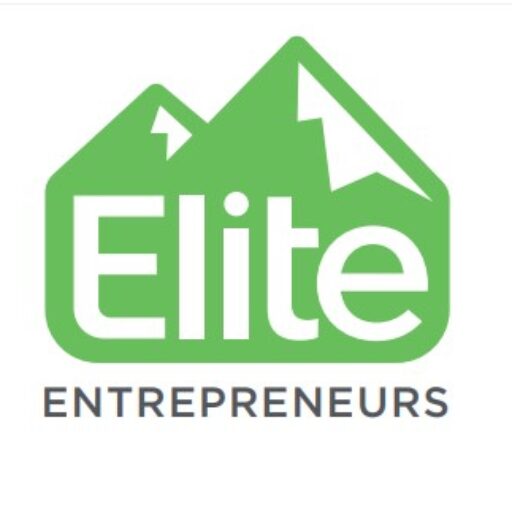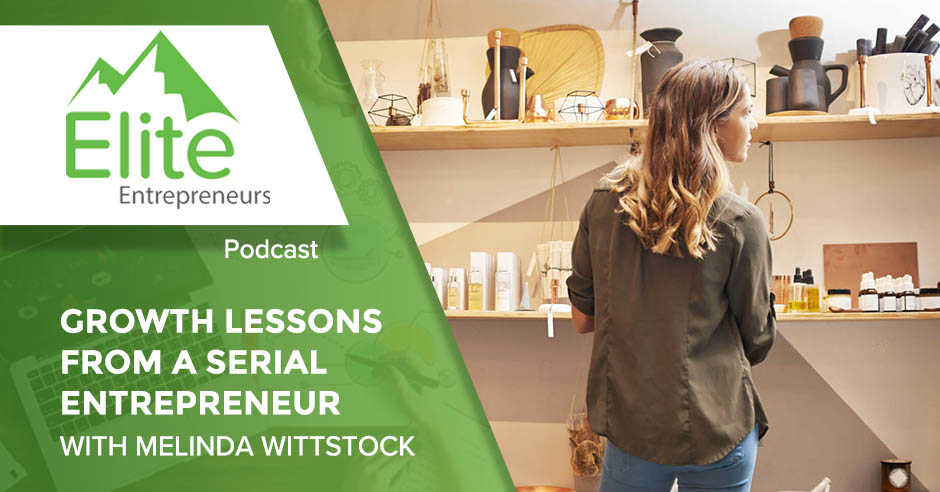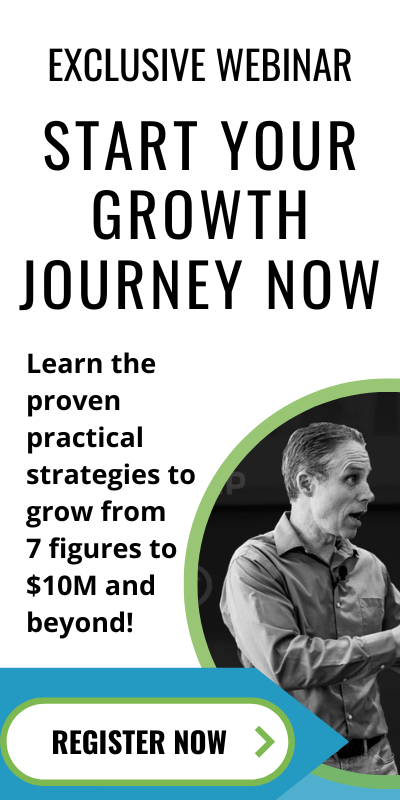Episode 31: Growth Lessons From A Serial Entrepreneur With Melinda Wittstock
Melinda Wittstock is a serial entrepreneur who has built four businesses in media and tech to 7- and 8- figures. She’s now building her fifth business as CEO and founder of Wings Media, the first interactive, social and “gamified” podcast network and audience engagement platform. Launching in Q2 2020 with an initial 50 podcasts with more than 100 million downloads, Melinda’s innovative mobile platform shares revenue with podcasters.
An acknowledged visionary in tech, media, mobile platforms, and social content, Melinda also hosts the fast-growing “Wings Of…Inspired Business” podcast named by Entrepreneur Magazine as #8 of 20 of the top business podcasts for 2020. Melinda also helps business owners and entrepreneurs launch magnetic and profitable podcasts. A passionate advocate for women entrepreneurs, Melinda also hosts the transformational luxury retreat and peer-to-peer mastermind “Wings of The Empowered Women” for successful women entrepreneurs committed to #liftasweclimb.
Formerly an award-winning journalist and TV anchor for the BBC, ABC News, CNBC/Financial Times Television and MSNBC, Melinda created and grew a BBC show to a 20 million audience and also innovated one of the first crowd-sourcing mobile apps, growing unique users to 3 million in 8 months. Steve Jobs told her she “asked the best questions” when she interviewed him as a 24-year-old correspondent of the Times of London.
She was also the CEO and Founder of Verifeed, the social intelligence platform assuring a Return on Authenticity™ from social media engagement. A practitioner of meditation, yoga, visualization, gratitude, and intention-setting, Melinda is passionate about encouraging conscious leadership and evolved entrepreneurship using business as a canvas to solve global challenges. Her travels have taken her to many exotic places including Sir Richard Branson’s Necker Island and the Amazon Rainforest.
She’s a loving mom to two teenagers and a golden retriever. She has spoken at Voice 2018, SXSW, Google, Fidelity Investments, Manhattan Chamber of Commerce, Georgetown University, Relentless MV, Columbia University, Underground Online Seminar, Pinnacle Global Network and many more.
What the podcast will teach you:
- Why only 15% of podcasters earn money from their podcast, despite podcasts being the fastest-growing content medium
- Why knowing your audience is vital to monetization but most tools today are insufficient, and how Melinda has built a “gamified” platform to help engage with listeners
- How Melinda’s broad experience in media has given her a unique perspective on podcasting and the ability to recognize and address pain points for podcasters
- How Podopolo™ was designed to be the best-in-class podcast platform and is the first and only podcast platform to share revenue with podcasters
- Why the biggest challenge Melinda faced after reaching seven-figures in revenue was learning to get out of her own way, and why she views mistakes as learning experiences
- Why maintaining the right level of control without micromanaging and filling the team with the right people has been the secret to Melinda’s business growth
- How relinquishing control and giving your team room to grow and develop new solutions can motivate them, while micromanaging your team is incredibly demotivating
- How Melinda struggled to adjust to “being the boss” when her team got large enough that she didn’t know everyone, and how she overcame her concerns of not being liked
- Why fear of the unknown and clinging to the familiar during periods of growth is a real problem, and how activities like meditation can help you conquer them
- Why a growing company needs a visionary who is free from day-to-day operations and who can be proactive rather than reactive
Resources:
- Website: podopolo.com
- Website: melindawittstock.com/
- Wings of the Empowered Woman Retreat: https://wingsexperiences.com/optin-2672225535211777
- Profit From Podcasting 7-step guide: wingspodcast.com/liftoff
- Work with Melinda: melindawittstock.com/work-with-me/
- LinkedIn: linkedin.com/in/melindawittstock/
—
Listen to the podcast here
In this episode, I’m excited to have with me Melinda Wittstock. She is from Wings Media. However, Melinda is a serial entrepreneur who’s built several businesses, four in media and tech. She’s built them to 7 and 8 figures. She is a veteran when it comes to seven-figure growth, which is what this show is all about. Thank you, Melinda, for taking the time to be with us.
Brett, it’s great to be with you.
Melinda is building her fifth business as CEO and Founder of Wings Media. I’m super excited about this. I’m going to do my best to explain it and then ask Melinda to explain it the right way. Wings Media is the company but they’re building the first interactive social and gamified podcast network and audience engagement platform. You’re calling it Podopolo, which is a fun name that you’ll tell us more about.
I’m super intrigued by this because as anybody who has a podcast knows and I’m one of them, you don’t get a lot of audience information from iTunes, Spotify or wherever your podcast is launched, posted or available. You can’t engage well with an audience that you can’t get information from or about. It’s difficult to know who it is that’s engaging with you or at least listening to you.
To take one step further and try to engage with them, it’s impossible using the tools. You’re doing something about that. I would love for you to share with all of us what that’s about before we circle back to some of your amazing entrepreneurial growth experiences that we’re going to mine for a lot of gold on this episode.
Podcasters have a massive pain point and it’s pretty simple. Only 15% of all podcasters earn a dime from podcasting. That means 85% don’t. That’s crazy because there’s so much great content out there and podcasting is the fastest growing medium. As an entrepreneur, I always look for where there are pain points. Most people see something wrong with something and I say, “Someone should fix that someday.” I’m always that person that’s like, “I have the answer here.” I put my hand up.
Only 15% of all podcasters earn a dime from podcasting. That means 85% don't. Share on XI know from all the media businesses I’ve done in the past, all the social networking, mobile platforms, data businesses and all the rest that it’s very difficult to make money from anything to do with content unless you own your audience. By owning your audience, it’s simply knowing who they are, their listening habits and who they are in the context of their demographics, psychographics, habits, interests and needs, frankly so those needs can be met.
Podcasting has grown up in such a way that the only data we have is download data. That doesn’t tell us anything at all, especially since most people don’t even download their podcasts. I can’t remember the last time I downloaded a podcast. I’m a pretty avid podcast listener. I stream my podcast. There’s debate in the industry but no one knows the exact figure. Is it 25:1 streaming to downloading? Is it 50:1? Is it 2:1? What is it?
We just know that the audience size is not known or at least not shared with us. The only way you can get to know your audience is like, “Let’s see if we can engage them onto an email list.” Maybe their last name and email address but that’s it. You’re still broadcasting to them. You’re not engaging them in a conversation. The next best thing is to get them over to Facebook, which is great. You can build a group, a community and all these things but Facebook still owns your audience.
That makes it very difficult to monetize with sponsorship or advertising because the advertisers look at this and have the same problem. They see only the download data. They require podcasters to have massive numbers before they’ll even consider advertising because it’s guesswork to them. How many of those people will convert? How many of those people are relevant to what the sponsor is offering?
What if both the sponsors, advertisers and podcasters had complete and utter transparency into that data? We call it audience intelligence. It changes the game. It means that a podcaster could have a very small audience but if you know who those people are, it means that they can be more easily monetized with an ad or a sponsor credit that’s relevant and is adding value for the listeners.
This is all stuff that I learned creating legacy media businesses, digital media businesses, doing social media analytics and all these things along the road. What we went and architected was a mobile and socially networked platform for listeners to engage directly with podcasters. In real-time over time, it’s dynamic and interactive.
When we say gamified, that’s a buzzwordy thing. What we mean by that is applying the things that make gaming engaging and frankly, addictive to a non-game situation. Rewarding and recognizing listeners for interacting with the content, helping to shape the content and putting the learnings of a podcast into action to improve their lives, businesses, health or whatever it may be. Moreover, engaging in challenges and being rewarded and recognized also for doing things to improve our world.
We have a lot of challenges and things around like the UN Global Goals, for instance. This is a way also to bring sponsors into this more dynamic conversation. As we engage listeners around this, we get to know them and the podcasters get to know them. As a result, not only do you own your audience but you’re engaging them and growing your tribe. You are making it much more of an exciting user experience for the people who are listening because you’re in conversation with them. The best content is conversation and community.
The best content comes from conversation and community. Share on XAll these things happen on this elegantly architected platform with a beautiful user experience. The reward and recognition are social. You feel good because you’re taking the learnings from a podcast, the entertainment from the podcast or whatever it is. You are connecting with other people around that content.
Melinda, you have a very apparent passion and energy around this project that you’re up to. It’s fantastic. What our listeners need to know is that when you say you have experience in media, tech and building audiences, what I didn’t share with them is that you’re an award-winning journalist and TV anchor from a former life maybe, before you got into all these businesses.
With BBC, ABC News, CNBC and MSNBC, you had a lot of experience in building audiences. You knew from that world and that legacy media business that understanding that audience was key to being able to monetize that relationship with sponsors and all the rest. You’re right. As podcasters, we don’t have that ability. It’s exciting what you’re working on and building. You’re not solving this problem just for others. You have a podcast yourself. Talk to us for a minute about your podcast.
It started as a passion project based on my entrepreneurial journey as a female entrepreneur trying to raise venture capital. In some cases, succeeding and more often, not succeeding. Women only get about 2% of the venture capital money. Even for scalable businesses that could conceivably become billion-dollar unicorns one day, it’s still 2%. The entrepreneurial journey is one of many ups and downs. I joke that if you want therapy, become an entrepreneur. It’s a rollercoaster. I wouldn’t have it any other way but it’s not for everybody.
I woke up one day having this epiphany and I thought, “There are all these amazing women out there with incredible businesses but it’s like we’re invisible. We’re succeeding in silence. We don’t fit the stereotype of the entrepreneur in a hoodie in a garage eating ramen noodles. We don’t look like Mark Zuckerberg.” Our experience is different. Women tend to come into entrepreneurship a little bit later in life.
I set out to affirm and acclaim the entrepreneurial journey of women and then some. How can we manifest the confidence, connections and capital that we need to succeed in business? I interview on Wings of Inspired Business women who have 7, 8 and 9-figure businesses. In some cases, high six-figure businesses. We focus on the relationship between business growth and personal growth. How do women do it differently? What happens when we try and do it like men? It doesn’t work out so well. How can we step into a more authentic feminine leadership? What does that look like?
That podcast started as a passion project. All these amazing things started to happen as a result of having the podcast. Apart from the dharma of paying it forward and giving other women a platform for their businesses to become known and for them to increase their sales, their chances of success and all of that, which is what I wanted, to provide a platform for other women to succeed, all these amazing doors and relationships opened.
Before I know it, I have five revenue streams for my podcast. I approached it like a content person. You’re right. I am an award-winning journalist, a TV producer and a former TV anchor. I know a lot about content and what makes content great. Wearing my business hat and entrepreneur hat, I also know that podcasting if done right is like a business.
You have to know your avatar, marketing plan and engagement plan, how you’re going to make money from it, how you’re going to sustain it over time, what kind of resources it needs and how are you going to make it work. I approach podcasting from that standpoint. It led me to the Podopolo Podcast Network because I saw all the structural problems that were wrong with podcasting which was making it very difficult when it doesn’t have to be difficult. It shouldn’t have to be difficult to monetize a podcast.
I want to get to Podopolo in a minute. Before we get off of Wings of Inspired Business, which is your podcast, I want to share with all of our readers, especially the women in our audience who are working hard to grow their businesses, that Wings of Inspired Business Podcast was named by Entrepreneur Magazine as number 8 of the top 20 business podcasts for 2020. It was cool. Good work.
It was huge because I was on that list in a company of a lot of men. It was cool to see myself next to Lewis Howes, Tim Ferriss and folks like that.
Let’s transition to Podopolo because I want you to explain where the name comes from. I know there’s an explanation. We’ll then transition to some of the valuable lessons that my readers would like to glean from my time with you. Tell us about Podopolo and then we’ll circle back to some seven-figure growth-challenging lessons.
Frankly, it was hard to find a name for this because it’s unique. It’s combining a number of things. On one level, it’s a social network because it’s a social way to engage and find podcasts. On this other level, it’s gamified. There are these challenges, contests and ways in which it’s a reward and recognize people for engaging with the content and beyond. It’s also a network and about podcasting. It had all these different things.
When most people think of a podcasting network, they think it’s a distribution platform like Apple Podcasts, Google Play, Stitcher, SoundCloud, Spotify or Pandora. This is so much more. We wanted to say podcasting, hence the pod in Podopolo but what was the other half of it? Polo is indicative of the play. You think of polo or maybe playing Marco Polo as a kid but also we were thinking around this idea of the Greek polis, which is the community. There’s a real community around this. It was a merge of all of those things.

Entrepreneurship Lessons: When most people think about a podcasting network, they think of a distribution platform like Apple Podcast, Google Play, Stitcher, SoundCloud, Spotify, Pandora, or whatever. Podopolo™ is so much more.
We’re trying to find a domain name that you like that’s not taken. At this point, you do have to make words. The one that we were thinking of was Podopoly, like Monopoly but that one, sadly, was taken. We ended up with Podopolo and we like it. We’re joking because people are like, “How do you pronounce that?” We’re going to make a little video that makes light of how you pronounce Podopolo and what Podopolo means.
I hope anybody who has a podcast or is considering starting a podcast will keep their eyes open for the launch, if that’s the word, of Podopolo. When is that coming?
That’s going to be in the second quarter of 2020. We’re in beta. The platform is fully built. We’re bringing in our first podcasters. Our initial 50 in the beta represents something like 100 million downloads between them. The big launch is in June 2020 but we wanted to go through a beta stealth period to make sure that we’re co-creating with our customers.
We’re bringing in their feedback because we want no separation between our walk and our talk. We say that we’re gamified, customer first and all of these things. We want to be able to make sure that we are building the network every step of it, from the onboarding process to the customer success to the experience for their listeners. Everything is best in class.
There’s a lot of work involved in that but it’s great. We’re getting great feedback from the initial beta testers. If anyone wants to be part of that beta group, hit me up for that because you will get free use of the platform for six months, a significant discount going forward and some free promotion out of it, which is an excellent deal. We launch with all of the fanfare in June 2020.
That sounds like an exciting time for you and the team. I look forward to seeing more about Podopolo and the impact that it will have. It sounds very disruptive in an industry that’s fairly new. It’s funny that for such a new high-tech thing as podcasting, not having that ability to understand the audience and the data around it and engage fully in it seems a little bit backward or wrong. Good for you for fixing it.
I buried the lead. We’re the first podcast network and the only one that shares revenue with podcasters. We’ll gamify this too. A portion of our top-line revenue goes to podcasters in proportion to how well they’re engaging people on the platform and that kind of thing. Every layer of it is gamified. We also sell ads and sponsorship both on air and on the platform. All those gamified challenges can be sponsored.
It’s exciting for brands too. We use this example a lot of how we’re using the seventeen UN Global Goals because I’m one of those entrepreneurs that believe that business is and must be the canvas for improving our world. Businesses can do a lot in terms of mission impact for everything from solving climate change and on. For instance, engaging people around challenges from everything like random acts of kindness, something like climate change or cleaning up plastics out of the ocean.
Think of a company like Corona beer that replaced the rings around its cans with a different type of ring that’s made of fish food. On a beach, it turns into fish food and there’s no plastic litter. Imagine them sponsoring a challenge for people who are cleaning up litter off the beach. This is also another unique thing about how this podcasting network and platform is being used to engage people around growing consciousness, personal growth, learning and joining together to take action to make the world a better place.
It’s cool what you’re doing, Melinda. I’m going to encourage people who want to learn more about you, specifically and how mission-driven you are to go to your website, MelindaWittstock.com. Let’s get to some of the seven-figure growth challenges, lessons learned and practical tips for our readers. You’ve been on this journey a few times with several businesses. Think back to those times when you crossed that million-dollar mark. Maybe you got to $1.2 million or $1.3 million. Maybe you started to feel some things had changed. What were some of the challenges that you faced north of $1 million in revenue?
The biggest one is getting out of my way. What I mean by that is relinquishing control of things. As a startup founder, you’re not controlling or you’re still the leader. I don’t mean like that but in terms of the doing, you can’t do everything anymore. You were good at doing all those things and you got good at doing all those things so you have to move swiftly to delegate, hire very quickly and accept the 80-20 rule. It doesn’t have to be perfect. A lot of women, in particular, fall under this trap of perfectionism.
It’s hard to relinquish control if somebody else doesn’t meet the standard that you have.
You have this vision in your mind and it can hold a lot of businesses back. Where it manifests is if you’re stuck in that, you find yourself burning out and frazzled. You find other aspects of your life falling apart because you’re not there for your kids, your partner or all that because you’re doing more. I’ve seen a lot of founders, if not corrected fast at that awkward stage, lose their joy in their business and forget why they’re even doing it.
I’ve gone through that experience with my first business in an awkward way. My MBA was from the school of hard knocks because I made all the mistakes. I still got there. I ultimately got it into an $11 million business but it was not easy. The difference though is mistakes are learning experiences. You just have to learn from them. Fortunately, there are enough entrepreneurs who’ve been on this path and enough knowledge out there that there’s no reason to repeat them.

Entrepreneurship Lessons: Mistakes are learning experiences. You just have to learn from them. Fortunately, there are enough entrepreneurs who’ve been on that path and have enough knowledge that there’s no reason to repeat it.
You could avoid some of the mistakes or at least dramatically shorten the learning curve.
For instance, on that particular note with Podopolo, it’s getting all the systems in place very early on.
You did already highlight some of the things that were happening for you but let’s circle back. You get to that $1 million-plus. The answer was, “I had to relinquish control.”
The answer is there’s no I in team. You need a team and systems. I have all those learnings in the relatively early stage I’m at with Podopolo. I have a lot of people to hire but we’re getting all the systems in place in a replicable way and all the standard operating procedures documented and laying the groundwork so that when we do and have to hire quickly, there’s not chaos. People know what they’re supposed to be doing.
I spend an inordinate amount of time, probably a huge part of my time, thinking about who are the ideal people that I need. I think of them almost like a marketer would think of their avatars. What are their 3:00 AM moments? What are the things? You want to make sure you have the right person, not just in terms of their resume but in terms of their psychological makeup maybe or their character.
They fit with your values, the company way.
They fit with the values but also, they’re doing the thing that only they can do. They’re solid in their unique purpose, which is different from your unique purpose as a person. I’m a real systems thinker so very early on, I spent a lot of time visualizing my team, the order, how they work together, who needs to be where and what seat.
I was thinking about attracting those people much like a marketer would think of attracting their customers because the team is everything. I was making sure that all those procedures are in place so that I can avoid the stress this time or that terrifying moment too. I’ve experienced this as well. You’re growing so fast that you can’t meet demand.
You look like you’re a nice swan above the water but below the water, your legs are going furiously. You can make a lot of mistakes in those moments. You can grow so fast and run out of cash if you’re not looking at your numbers. There’s a whole bunch of things at that $1 million to $3 million that are very dangerous. A lot of companies die there.
The ones that don’t, many of them decide to retreat like, “I don’t like it up here. It was much less chaotic. I was making more money as the business owner when I retreat to $700,000 or $800,000 with a smaller team.” A lot of businesses do that. If you believe in purpose-driven values-based companies, like I know you do, to have that company retreat to a place of insignificance is not what we want. We want to have worthy companies out there doing amazing things.
If these little people’s challenges are the things that are tripping them up, let’s figure it out instead of retreating to a place of comfort. You got to relinquish control. You figured out the importance of having the right team. I love that you talk about hiring as a form of marketing. You’re marketing to the ideal team player for your team and the role specifically.
You want people who are empowered and love what they do. Honestly, it’s not just about money. It’s about them getting real satisfaction from their work environment. For some people, it might be more valuable to have flexible working hours than have an extra zero on their paycheck. Understand what’s motivating your key team members and make sure that they are getting a lot out of it. Part of it is being aligned on the mission. Thinking about the metrics, what does success look like? Knowing your numbers and these sorts of things is very important.
One thing about relinquishing control is relinquishing control over the minutiae. The better way to explain that is I’ve learned not to sweat the how when I’m managing people or leading people. I want to hire experts and people who are smarter than me in that particular area. I can share with them the result that I want but it’s up to them to come up with the how. I don’t want to be micromanaging the how. A lot of leaders go wrong there. In technology, if you’ve ever run a tech team, what you get from that is malicious obedience. You tell them the way you think it should be built.
They’ll do exactly what you say but it sucks. I’ve learned that one too. It’s important to stay focused on the why and the what. What is the result? Include your employees and team members in defining that success. Give them leeway to come up with the best solution and allow them the opportunity to grow. This is what I mean by relinquishing control. If you’re in that micromanaging thing, it’s the fastest way to demotivate anybody on your team.
Micromanaging is the fastest way to demotivate anyone on your team. Share on XMelinda, that’s great from a been-there-done-that leader of a seven-figure business. I spend all of my time helping business owners do what you described. I don’t know that I could have said it any better. Good work. Let’s transition from the key lessons that you already highlighted, relinquish control and all the people aspects that you discussed. You mastered those things. You got systems and processes in place. You were relinquishing control. You had the right team members. What was next? What challenges surfaced after that that you’re like, “There’s more to solve after that?”
The weird thing is that moment where you walk in the door of your company and you don’t necessarily know everybody.
How do you keep all that going when you not only hire people that you’ve never met before but hire people that you’ve never met before then? Not that they never met in an interview but they didn’t know them and then they’re hiring people they didn’t know.
This is the weird thing if you have something in your character where you want to be liked, be part of a team and all that. I’m very much like that. I’m very democratic in that sense. It was a big adjustment because, suddenly, people are looking you at like the boss. They’re projecting all kinds of stuff on you that isn’t necessarily true. How much of yourself to reveal and how much not is tricky? I wish I had a great answer for that.
A lot of people struggle with that because their identity changes. I’m such an empath and I can pick up on people’s feelings very easily. I did standup comedy with a bunch of entrepreneurs in New York. We performed at Caroline’s. The whole opening of my routine was all about the difficulties of being an empath. I can walk down the street and I don’t know whose feelings are mine or somebody else’s. If I suddenly flip off a nun or something, I know that’s not me. That’s everybody else.
I didn’t have that self-awareness the last time I was in that situation. It was hard because I’d be feeling things and I wasn’t sure. I’d be paranoid. I was like, “They don’t like me,” that kind of thing. I say this because this is a very human thing. Most business owners don’t talk about that, how to be an inspiring leader and get things done. Especially for women, we have such a fear of not being liked. We can shy away from conflict, not fire fast enough or be afraid of being polarizing. You have to let go of that stuff as well. It’s what I learned. It doesn’t say anything about you but there’s a way to do it. There’s an empathetic way to be a strong and clear leader.
It starts at the beginning like setting expectations right from the get-go, checking in, being a good listener, asking lots of questions and having those systems in place. The weirdest thing about entrepreneurship for me is once you master something, it feels good and everything’s working, then you grow a little bit more.
There's an empathetic way to be a strong and clear leader. It starts with setting expectations right from the get-go, checking in, being a good listener, asking questions, and having systems in place. Share on XSuddenly, what was working before isn’t working anymore. You have to reinvent yourself. Climbing up that isn’t for everybody. I have no desire to take a company to IPO. I will sell my company long before that. I know who I am. I’m such a starter. I love that from the idea stage into the eight figures. At that point, I know about myself. I don’t want to run a corporation. Some people can take the whole run. You look at someone like Mark Zuckerberg, for instance. The whole run is very rare.
Understand who you are. I come back to my joke about it being great therapy. Be a good listener. Be very conscious. Understand that at different phases of the process, you’re going to have a lot of personal fear. The fear is going to be born of things that are unknown and you’re going to want to cling to the familiar just because it’s familiar. Much of this is having the right mindset, understanding what’s triggering you at any different point, having great coaches and mentors around you, conscious people around you too and doing a bit of meditation. All those things are very important throughout business growth.
Those are all fabulous lessons. I want to prompt you for one more. It may not even be one that you had any challenges with. If it is, just tell me, “Nope, I didn’t have that challenge.” I’ve seen lots of entrepreneurs in that seven-figure growth journey struggle a little bit with the balance between short-term focus. Everybody’s pretty good about the here and now. “We got to deliver the numbers for this week or this month. Keep the lights on.”
They know how to manage the results. They have a harder time balancing continued excellence with strategic progress or forward-looking longer-term stuff. Did you build anything into your business from a rhythm standpoint or any process that enabled you to balance that a little easier than what normally happens?
To begin with, in the first business, I was lucky because I had my integrator or COO pretty much right from the start. She was able to be on that operational shorter term while I could be where I’m best, which is somewhere around 30,000 feet up in the sky. At 30,000 feet, I can see the whole landscape. I can see clouds approaching, weather systems, trends and all the different things. I can see ahead.
A CEO, especially a visionary CEO, needs to stay up there. You almost have to train your folks to come up to you because if they bring you down and you come back down into the operation, you are blind. Other people are probably better at the operations than you. Anyone reading who is interested in the COO position, we’re always looking for our COO.
That operational, I’m keenly aware of exactly as you described. If the visionary of the company is stuck in the operational detail, suddenly you are blind. That’s not a good place to be because the pace of innovation with our technology is so fast. If you’re just looking down and you’re not aware of what’s going on in your ecosystem or beyond, you can be heading for some pretty dreadful surprises. You end up being a reactive leader rather than a proactive one.
What a gift for you and your previous companies to have that visionary leader. It’s a strength for you already or naturally. It’s a lot with the business owners I know and I’m guessing it’s the same for you. They come from more of the operational or technician so they know their craft so well. They built one thing at a time within their business to grow it so they have a hard time coming out of the operations. Usually, I’m trying to help them make that leap to that 30,000-foot view because they get stuck in that operator role. It’s awesome for you and your businesses that you didn’t have to do that.
There’s a great book for this and I’m sure you know it. I’m naturally a visionary. It’s who I am. I am dangerous at the operations though. I’m good enough at it that it’s tempting for me. The book is called Rocket Fuel and it’s been out for a long time. Read that and take the quiz at the end. Are you a visionary or an integrator? Its whole thesis is that the best companies have two people. One is a visionary and one is an integrator or operational person that is equivalent in their talent and skill. They work seamlessly together.

Rocket Fuel: The One Essential Combination That Will Get You More of What You Want from Your Business
When I took this test, I was 98% visionary but I was 86% integrator. To me, it feels like a curse. I’m very good at the integrator stuff but I shouldn’t be doing it because it’s wearing two hats and confusing to a team. Somebody else needs to go do that because I lose my vision if I’m down in the weeds doing the operation just because I can. It’s dangerous.
We’ve found that some of those integrators can learn some things to pull themselves up to be more visionary and get out of the day-to-day. Some of the natural visionaries that don’t have a good integrator available can build some things into the rhythm and routine of the company that allows the team to handle some of those things. Sometimes, if you don’t have a business partner who naturally fits that integrator role, you’ve got to make do with what is until you can afford to bring somebody in.
I’m there. It’s funny because history repeats itself. Each time, as a serial entrepreneur, you do it, you have a lot of the same challenges, only they’re slightly different. You’ve learned from the past but things have changed. There’s enough that’s different. It’s the same but not.
You can’t cheat the process. The process is still there.
Even if you’re experienced, you still find yourself with these painful things and the chicken-egg part of it as well where you need to hire but you think, “I don’t know if I have the money for that.” For anyone who’s in that situation, there’s a statistic that if a business has hired anybody, within the first six months of operation, their chances of succeeding are astronomically higher. I forget the exact percentage but it’s compelling.
I look at hiring as an investment because, for each person you bring in, you’re liberating more revenue. If you look at that person, not so much as a cost center but as an investment that’s going to get a return, what’s the return on investment you’re going to get from bringing that person on? With that little subtle but big shift in your thinking, it changes the game.
Melinda, you’ve been a delightful guest. Thank you for all of the wisdom that you shared with our seven-figure business owners who are working through some of those challenges as we speak. I’m pleased for you and excited about Podopolo and the big launch that you have. I wish you all the best in finding your next integrator in your COO role so you can stay at 30,000 feet. Is there anything else you want to share with people about the best way to connect with you or your podcast or learn more about Podopolo? Where would people go?
I’m all over the place on social media, @MelindaWittstock on LinkedIn and Facebook and @MelindaWittstock2020 on Instagram. My website is MelindaWittstock.com. As Podopolo gets going, you’ll start to see a lot of things on social media about Podopolo as well. Anybody interested in learning how to podcast, we do a lot of things in the company to help people launch profitable podcasts within twelve weeks. You can check that out at WingsPodcast.com/LiftOff. I also host retreats for 7, 8 and 9-figure women entrepreneurs. We have one in Costa Rica. That’s going to be amazing. You can find out about that at WingsExperiences.com/Apply.
Thank you, Melinda, for your time. For all of our readers, especially that section where Melinda went into her real experiences and learning, she was growing through that seven-figure stage, you’re going to want to go back and re-read some of those lessons. They will save you a ton of headaches and probably, a lot of heartache and mental health days as well. Thank you for reading, everybody. Melinda, thank you for being with us. Keep following the show. Share, rate and review it. We want to help as many seven-figure business owners out there as we can. We’re going to continue to bring great guests like Melinda. Thank you again, Melinda.
Thanks, Brett. It was an absolute delight.
Important Links
- Melinda Wittstock
- Podopolo
- Wings of Inspired Business
- Rocket Fuel
- @MelindaWittstock – LinkedIn
- Facebook – Melinda Wittstock
- @MelindaWittstock2020 – Instagram
- WingsPodcast.com/LiftOff
- WingsExperiences.com/Apply
Want to listen to more? View all episodes here >



